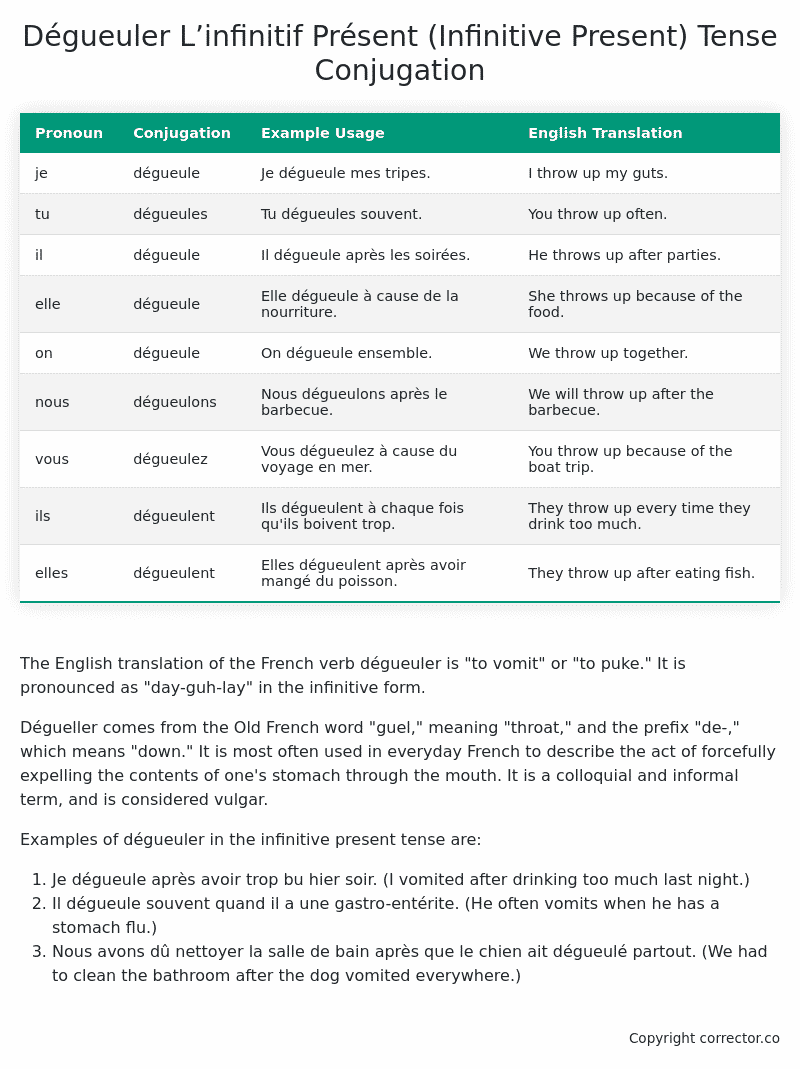L’infinitif Présent (Infinitive Present) Tense Conjugation of the French Verb dégueuler
Introduction to the verb dégueuler
The English translation of the French verb dégueuler is “to vomit” or “to puke.” It is pronounced as “day-guh-lay” in the infinitive form.
Dégueller comes from the Old French word “guel,” meaning “throat,” and the prefix “de-,” which means “down.” It is most often used in everyday French to describe the act of forcefully expelling the contents of one’s stomach through the mouth. It is a colloquial and informal term, and is considered vulgar.
Examples of dégueuler in the infinitive present tense are:
- Je dégueule après avoir trop bu hier soir. (I vomited after drinking too much last night.)
- Il dégueule souvent quand il a une gastro-entérite. (He often vomits when he has a stomach flu.)
- Nous avons dû nettoyer la salle de bain après que le chien ait dégueulé partout. (We had to clean the bathroom after the dog vomited everywhere.)
Table of the L’infinitif Présent (Infinitive Present) Tense Conjugation of dégueuler
| Pronoun | Conjugation | Example Usage | English Translation |
|---|---|---|---|
| je | dégueule | Je dégueule mes tripes. | I throw up my guts. |
| tu | dégueules | Tu dégueules souvent. | You throw up often. |
| il | dégueule | Il dégueule après les soirées. | He throws up after parties. |
| elle | dégueule | Elle dégueule à cause de la nourriture. | She throws up because of the food. |
| on | dégueule | On dégueule ensemble. | We throw up together. |
| nous | dégueulons | Nous dégueulons après le barbecue. | We will throw up after the barbecue. |
| vous | dégueulez | Vous dégueulez à cause du voyage en mer. | You throw up because of the boat trip. |
| ils | dégueulent | Ils dégueulent à chaque fois qu’ils boivent trop. | They throw up every time they drink too much. |
| elles | dégueulent | Elles dégueulent après avoir mangé du poisson. | They throw up after eating fish. |
Other Conjugations for Dégueuler.
Le Present (Present Tense) Conjugation of the French Verb dégueuler
Imparfait (Imperfect) Tense Conjugation of the French Verb dégueuler
Passé Simple (Simple Past) Tense Conjugation of the French Verb dégueuler
Passé Composé (Present Perfect) Tense Conjugation of the French Verb dégueuler
Futur Simple (Simple Future) Tense Conjugation of the French Verb dégueuler
Futur Proche (Near Future) Tense Conjugation of the French Verb dégueuler
Plus-que-parfait (Pluperfect) Tense Conjugation of the French Verb dégueuler
Passé Antérieur (Past Anterior) Tense Conjugation of the French Verb dégueuler
Futur Antérieur (Future Anterior) Tense Conjugation of the French Verb dégueuler
Subjonctif Présent (Subjunctive Present) Tense Conjugation of the French Verb dégueuler
Subjonctif Passé (Subjunctive Past) Tense Conjugation of the French Verb dégueuler
Subjonctif Imparfait (Subjunctive Imperfect) Tense Conjugation of the French Verb dégueuler
Subjonctif Plus-que-parfait (Subjunctive Pluperfect) Tense Conjugation of the French Verb dégueuler
Conditionnel Présent (Conditional Present) Tense Conjugation of the French Verb dégueuler
Conditionnel Passé (Conditional Past) Tense Conjugation of the French Verb dégueuler
L’impératif Présent (Imperative Present) Tense Conjugation of the French Verb dégueuler
L’infinitif Présent (Infinitive Present) Tense Conjugation of the French Verb dégueuler (this article)
Struggling with French verbs or the language in general? Why not use our free French Grammar Checker – no registration required!
Get a FREE Download Study Sheet of this Conjugation 🔥
Simply right click the image below, click “save image” and get your free reference for the dégueuler L’infinitif Présent tense conjugation!

Dégueuler – About the French L’infinitif Présent (Infinitive Present) Tense
Forming the Infinitive Present
Common Everyday Usage Patterns
As a Verb’s Dictionary Form
After Modal Verbs
As an Imperative
In Infinitive Clauses
Interactions with Other Tenses
Present Tense
Future Tense
Conditional Tense
Passé Composé
Imperfect Tense
Subjunctive and Conditional Moods
Summary
Want More?
I hope you enjoyed this article on the verb dégueuler. Still in a learning mood? Check out another TOTALLY random French verb conjugation!


